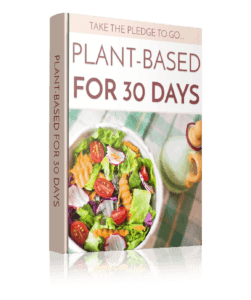The Benefits of a Plant-Based Meal Plan
Perhaps you read Rip Esselstyn’s The Engine 2 Diet or Jonathan Safran Foer’s Eating Animals and want to reduce your risk of lifestyle related diseases and avoid factory farms, or perhaps it’s the recent U.N. study that said eating less meat is better for the planet — either way, there’s no doubt that reducing your meat intake and embracing a plant-based diet is one of the best things you can do for your health and the environment.
It’s trendy too, thanks to UC Berkeley professor and food writer Michael Pollan, famous for In Defense of Food and Omnivore’s Dilemma. His simple credo re-defined what it means to eat smart today: “Eat food. Not too much. Mostly plants.” Pollan emphasizes the importance of knowing how one’s food was raised, eating locally and organic by “shopping the seasons” at the farmers market, and avoiding the growing number of “Frankenfoods” on the market — high in mysterious additives. “Don’t eat anything with ingredients your grandmother wouldn’t recognize!” he warns. His advice may sound like a joke, but when it comes to food chemicals, trans fats, and genetically modified foods, it could help prevent long-term health implications.
Many others have contributed to the “flexitarian” paradigm: from well-known garden-to-table chef Alice Waters, DYI urban homesteaders like Novella Carpenter, and the Oscar-nominated film, Food Inc. Keeping transportation and environmental costs in mind, this philosophy of eating says support your farmers market, eat whole foods, and limit your meat consumption to grass-fed, wild meats.
What is a Plant-Based Diet?
A plant-based diet is exactly what it sounds like. It’s a diet that is quite different than the standard American diet, which is generally based around meat and animal products.
Think about the traditional breakfast; eggs and bacon, right? What about lunch? That’s probably a sandwich with some type of lunchmeat. And dinner… well, if there isn’t meat on the plate then it’s probably not dinner.
A plant-based diet focuses on vegetables, fruits, grains, nuts, and seeds. And oh boy there are so many different foods to choose from. You’re going to be amazed at the variety. Many people feel like a plant-based diet is going to be restrictive. The opposite is true. When you come around to eating foods that are grown, rather than born, your mindset shifts and you realize the bounty that surrounds you.
Adopting a plant-based diet can be a great move for your health as well as the environment. Take the Pledge to Go Plant-Based for 30 Days challenges you to try the diet for 30 days and see how you get on!
So If you want to get started with a plant-based diet check out the 23-page eBook by Clicking Here
